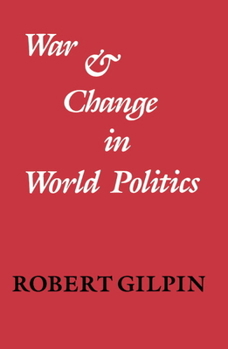War and Change in World Politics
Select Format
Select Condition 
Book Overview
This book strives towards a systematic understanding of international affairs. Professor Gilpin argues that although major political changes result from unique and unpredictable sets of developments,... This description may be from another edition of this product.
Format:Paperback
Language:English
ISBN:0521273765
ISBN13:9780521273763
Release Date:November 1983
Publisher:Cambridge University Press
Length:288 Pages
Weight:0.99 lbs.
Dimensions:0.8" x 6.1" x 9.2"
Customer Reviews
3 ratings
How to build an empire
Published by Thriftbooks.com User , 14 years ago
Nice work. I used some of its insights in my own _Iraq 2003: Causes and Consequences of an Imperial Expedition_ (Editions Tour Blanche, 2007), and my _A History of the British Conquest of Afghanistan and Western India, 1838-49_ (Lewiston, NY: The Edwin Mellen Press, 2009).
Changing Trajectories in a Hierarchical Structure
Published by Thriftbooks.com User , 24 years ago
For many years I have relied on War & Change in World Politics as a structural guide to examining international relations. Gilpin's classic work provides, both clear historical and theoretical support to augument his argument. His thoughts reside firmly in the realist tradition, but adds to the richness of that paradigm through focusing on transition. Gilpin correctly argued that,"Throughout history a principal objective of states has been the conquest of territory in order to advance economic, security, and other interests. Whether by means of imperialist subjugation of one people by another or by annexation of contiguous territory, states in all ages have sought to enlarge their control over territory and, by implication, their control over the international system. For this reason, a theory of international political change must of necessity also be a theory of imperialism and political integration.(23) The firm goal of Gilpin is to creat a theory of the transition of power relations. I believe that he has provided the initial steps through his courageous attempt to provide framework developing a theory of change. I first read War & Change while residing in Western and Central Europe, from 1989 to 1999. I was at the tearing down of the Berlin Wall, The Gulf War, and witnessed the collapse of the Soviet Union and the reunification of Germany. Gilpin's book provided structure to my studies and my personal search for understanding of the dynamics of these profound changes in societies. I evaluated theories of economism, based on American capitalism versus European and Japanese socialism and the belief in a new tri-polar order and found them theoretically broken down in War & Change. Gilpin argued that,"Although multipolar systems can become tripolar, the more usual occurrence is for bipolar systems to become tripolar, and as Waltz correctly observed, tripolar systems tend to be the most unstable os all....Thus the emergence of a powerful China, Japan, or united Europe would undoubtedly prove to be a destabilizing factor in contemporary world politics."(91) The explosion of the Internet changed for many the equation of power. However, the technological catch up tactics of Japan in the 1980s had many Americans worrying that it's comparative advantage was being lost. The Internet will decrease the curve and the trajectory of technological catchup policies. Take a read of pages 173-178 to fully appreciate Gilpin's analysis of pre-Internet military and technological trends. The ideas of democracy as the only legitimste form of government were dismayed by my real life experiences and I found support and faults in my analysis of this situation in Gilpin's work. In closing, I believe that Gilpin needed to concentrate his argument more on a particular structure of change. However, because of the wide range of issues that increase the factors of change and the trajectories of states an explanation of
Excellent book
Published by Thriftbooks.com User , 24 years ago
Although somewhat dated, "War and Change" is one of the great books in International Relations Theory. Robert Gilpin puts forth the theory that would inspire Paul Kennedy to write his "Rise and Fall of the Great Powers" years later. Gilpin's theory is basically this: powerful states in the international system tend to spend a lot to maintain its militar proeminance. But while it is wasting a lot of money to enforce the "rules" of the system, revisionist powers can compete with less costs. When there is a "de facto" balance between these powers, there's an hegemonic war that settles it straight. And then, there is a new cycle. "War and Change" is really worth reading and it shows a different position in the "neorealist" debate inaugurated by Kenneth Waltz in his "Theory of International Politics". A final advice: just read it if you're a bit aquainted with IR theory, or else it'll be pretty boring.




